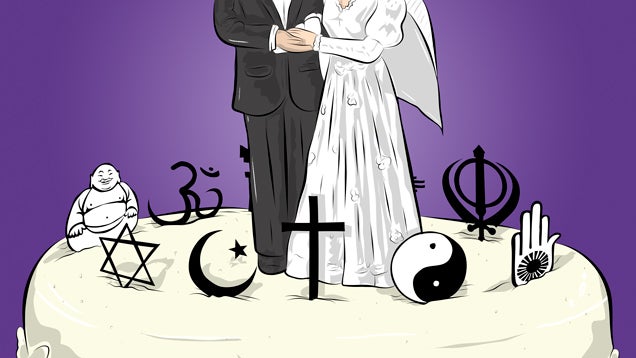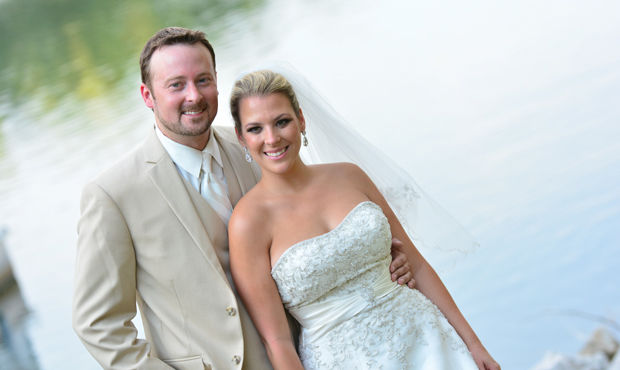This past June, I got married. It was one of the best days of my life, and I
hope to never have to experience it again. As anyone who has been through one
knows, weddings are a deeply magical experience festooned with deeply unmagical
questions: inside or outside? Who pays for what? Is beet salad an "appropriate"
main dish? Should we rent these ponies? Behind which bush do I need to crouch to
smoke my cigarettes, and do I need to wait to play "Big Pimpin'" until after
dark?
But never were the conversations with my fiancé more tender—never was the
pink belly of Us more exposed—than when discussing the ceremony. As it should
be, I think—the ceremony being the formalized articulation of the union, the
part that should ideally express your private identity as a couple and yet serve
as something that your friends and family can feel included in, too. Having been
to a handful of priestless, DIY-type occasions before (and having officiated one
myself), I was inclined to script the ceremony ourselves, in collaboration with
an officiant picked from our friends or family. After some good, long
conversations, my now-wife and I settled on our target: her dad.
Some background: Both my wife and I are Jewish. For those who don't know,
Jewishness, the identity—as opposed to Judaism the religion—is one of those
unavoidable technicalities of birth: You either are or you aren't. (There's a
good David Cross bit in which he tries to tell a rabbi that he doesn't feel
Jewish, to which the rabbi keeps asking—in his placid, rabbinical way—if Cross'
mother's vagina is Jewish, a fact he can't talk his way out of.) As a kid, I
went to Hebrew school and got Bar Mitzvah'ed; in college, I came home for the
high holidays and led my family's Passover Seder. Jewishness was never something
I enjoyed or felt close to, but I performed it the way I mowed the lawn or
cleaned the house: Dutifully, with a tinge of grudge that always dissipated into
mild boredom. Setting aside the specifics of my own beliefs for a minute, I can
say that Rabbi Silverman would probably be disappointed, and yet as someone
fully indoctrinated to Jewish guilt, I feel compelled to tell Rabbi Silverman
publicly that I'm sorry.
My wife had a better experience, and still maintains a kind of abstract
commitment to the idea of it—"it" meaning "being Jewish." Her parents are more
formal in their practice. You can see the conflict taking shape here, regarding
the wedding: We wanted to be true to ourselves, fair to each other, and
respectful to her parents, especially considering that it was her father who
would be doing the spiritual and legal business of putting us together.
 picture: QueenieBridal lace wedding dresses
picture: QueenieBridal lace wedding dresses
I concede that this situation could have been infinitely worse: Her parents
didn't consider me a heathen or think I was going to burn in hell for what I did
or didn't believe. (My wife's sister had the very sad experience of having her
childhood rabbi decline to marry her and her husband because his family was
vaguely Christian, despite the fact that her husband personally wasn't religious
one way or the other and made his peace with raising his children Jewish clear—a
miserable, disillusioning situation.) Still, the friction was there. Would we
say prayers? Would they be in English or Hebrew? Would we invoke God, and if so,
would we invoke God as such?
At first, I tried to register my feelings in the most general terms possible:
I didn't want to have a religious ceremony. It turns out that what constitutes a
religious ceremony is up for some seriously passive-aggressive debate. Then I
tried to register my feelings with bureaucratic specificity, as though
programming a microwave: I'd prefer if there wasn't Hebrew, I'd prefer if we
didn't use the word "god," etc. Mostly this served to escalate things to their
inevitable head: a conversation with my almost in-laws about god. Humbly, some
tips.
1. Know what you believe.
If this seems like an insultingly easy step, congratulations: You're probably
already living on top of a mountain, breathing deeply of the aspens and firs,
spending your mornings riding a bicycle and your afternoons embedded in haiku,
with a few minutes of checking up on investments before dinner, which you will
take amongst the elk. For most people, though, I sense that this is a process
that takes one's entire young life to work out, with plenty of paralyzing
moments of questioning afterward. (I can't say for sure, because I don't think
I'm old enough just yet.) It wasn't until I considered dissenting from my wife's
parents' beliefs that I realized I wasn't entirely sure of my own—a realization
that I probably should've made on behalf of my own parents, but I've already
apologized to Rabbi Silverman, and I risk dignity if I get too loose with my
regrets.
What I'm trying to say here is that maybe you need to take yourself into a
dim corner and ask yourself what it is you really want out of this
religion-and-spirituality thing. Maybe it's nothing, maybe it's everything; in
any case, when entering a space in which such topics could be of interpersonal
consequence—planning a wedding, for example—it would serve you well to have been
seriously honest with yourself, outside the shadow of your parents, outside the
shadow of your community, etc. I joke with my wife that if she wants our
children to be Bar or Bat Mitzvah'ed, I'm fine with it, as long as I can drive
them deep into the desert with a gun and a huge sack of marijuana after the
ceremony, because in god's eyes, that's the day they become an adult, and in
turn should be given the adult privilege of making adult decisions. (They could
shoot the gun or bury it in the ground; they could smoke the marijuana or feed
it to a horse. This is one of the many ways I undermine my rearing.) Point being
that if you're getting married, there's a good chance you're already an adult
whether you realize it or not, so do yourself a favor and treat yourself like
one. Ask yourself: How do you feel about the metaphysical world?
2. Say what you believe.
Sweating the prospect of telling your future in-laws that you think god is a
corridor of energy that opens up between two people who in the face of all
life's cacophony are able to see each other without judgment? I get it. But try
and handle this the way you might handle the "What do you want to do with your
life?" question: Nobody wants to hear you say, "Well, my degree is in Cherokee
mysticism, but I had a pretty good time detasseling corn last summer, and I'm
really into seals, so maybe, well … we'll see!" Steadiness will serve you well
here; certainty will, too. Remember: You're marrying their child. Do them the
kindness of presenting yourself as someone who has a grip on his or her life,
even if these characterizations usually end up being projection. Maybe this is
my own naïveté talking, but I would guess that your future in-laws are
ultimately less concerned with you having the right answer than you having an
answer at all.
Which brings me to an aside, or maybe a sub-step: State your beliefs in a way
that doesn't step on anyone else's. (Or as my therapist, Dr. Gary, would put it:
Try and avoid "You" statements.) Maybe you're an atheist because you were raised
in the church and it ran out of answers for you, or you sensed some cruelty and
inconsistency in its teachings. All right. But nobody wants to hear that the
foundation of your beliefs is that everyone else's beliefs are wrong—it's
disrespectful, unproductive, and ultimately beside the point. If we're talking
about your beliefs, why should anyone else's even enter into the conversation?
(Rhetorical question.)
I don't know how this squares with Christian mandates about missionary work
or spreading the lord's word to every darkened corner, but I do think that—in
light of step two's mandate for honesty—the crux of anyone's outlook on the
world is ultimately a private thing, a thing that can exist in a vacuum.
Certainly I acknowledge the history of new ideas growing out of friction between
old ones (America!), but I also think that reactions are usually just the
catalyst for some idea that comes to stand on its own. Think of it like a side
project or a television spinoff. Nobody wants to have their relationship with
god (or lack thereof) be called a spinoff.
3. Prepare to be somewhat disappointed.
Did you think this was going to end with some sweet, convenient story about
my future in-laws telling me that they understood where I was coming from and
were so proud of me for speaking my mind, and were even a little curious for me
to share some more of my spiritual findings with them? Hmm. The reality was more
that we—my wife and her parents and I—were all sitting around the dining-room
table talking about the ceremony, and I said what I felt I had to say. (In
short: I do believe in god, not as a creator or divine being but as a projection
invented by people to try and consolidate everything we cherish but can't
exactly define. I like prayer in a casual sense, whether it's a low-key grace
before a good meal, or just marking a moment with appreciation through silence.
Bluntly, god is the sound of my wife breathing at night, and what saves me from
suicidal thoughts while reading the closed captions of Tim Allen sitcoms at the
YMCA.)
Back to the table, where things got seriously quiet. I tried to make eye
contact with everyone, but nobody returned it. Then my future father-in-law
looked at his watch and said he had some errands to do.
When you're a kid, you're an electron buzzing around the nucleus of your
parents or whoever else might've raised you. But part of getting married—at
least as I see it—is splitting off from your familial atom and forming a new
nucleus. I don't know how chemistry works; I only know that I passed it. But the
metaphor always made sense to me: In marriage, you and your spouse become the
center of some new life form instead of continuing to live at the fringes of an
older one.
In the end, a Jewish god arrived at our wedding in some abbreviated form.
(Compromise is always the most realistic of happy endings, though it doesn't
make much of a story.) Honestly, I can't even remember the ceremony—like almost
every other detail about the day, it got lost in the swell. (Though I will say
that you should probably not go with beet salad as a main dish unless you're
prepared to answer mean questions about beet salad.) What I do remember is the
uncomfortable feeling of sitting at that table, then the uncomfortable feeling
being replaced by something lonely but sturdy, something I would have to sit
with but something I could call mine.
An anecdote, to finish: I remember putting together the ceremony for my
friends' wedding and asking if I needed to include any kind of religious
sentiment to appease the bride's family, who were devout Christians from that
volatile state of Florida. "I think that ship sailed a long time ago," the groom
said. Still, when the day came, I was nervous—I didn't want to be responsible
for any kind of spiritual infraction. Like my own in-laws, I think theirs were
quietly a little hurt by the omission of anything overtly religious, or maybe
had hoped by some evolutionary instinct that their own teachings would seep into
a new generation.
It's amazing, though, what a brass band and a good cocktail will do. At one
point I found myself with the newlyweds and some of the bride's aunts and
uncles, saying their congratulations. "What'd you guys think?" the bride asked.
I could almost see the pain on her aunt's face as she composed the answer, like
she was talking through a lemon. Then she sighed and smiled and said, "Well,
gosh, it was just so dang y'all."
read more:
QueenieBridal strapless wedding dresses







